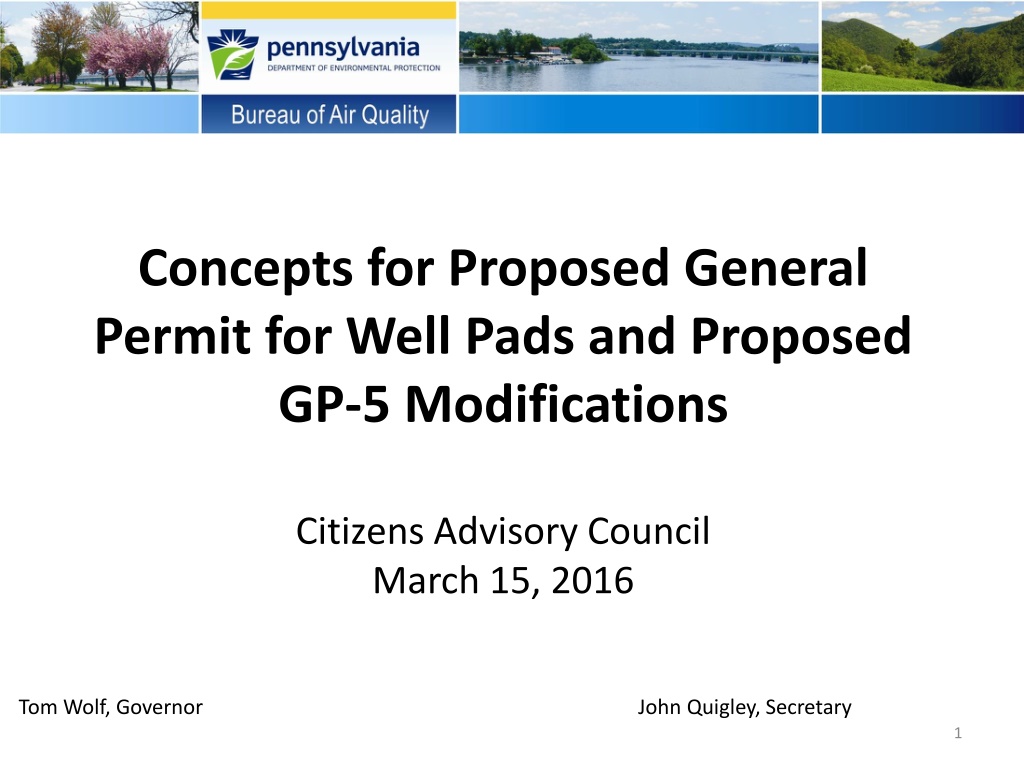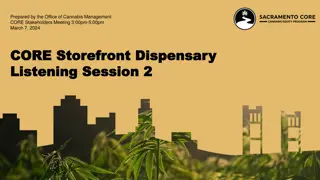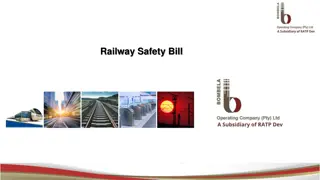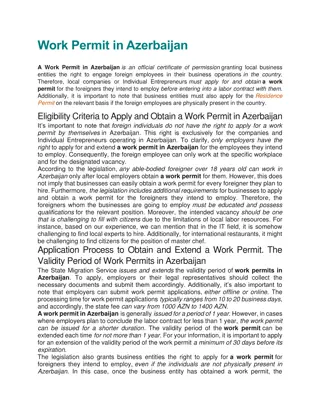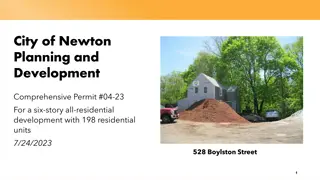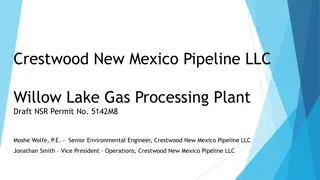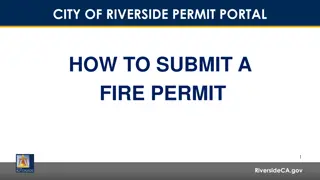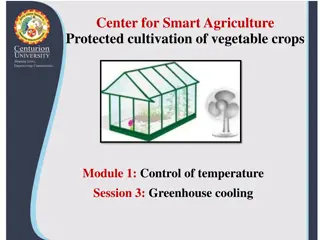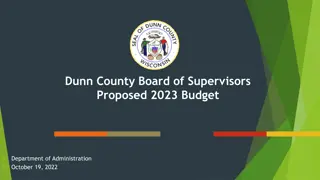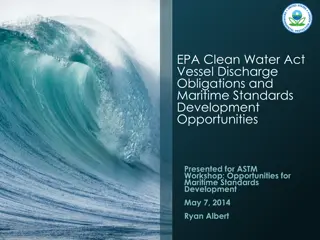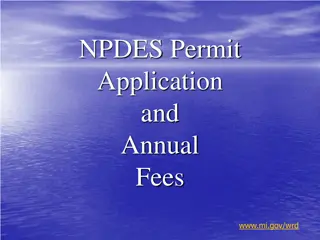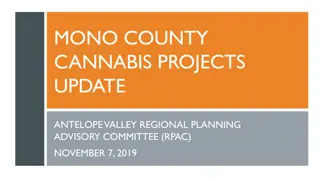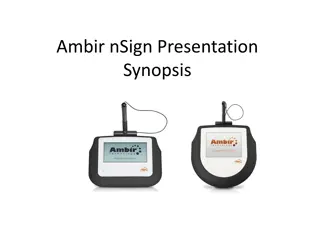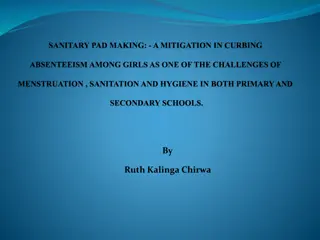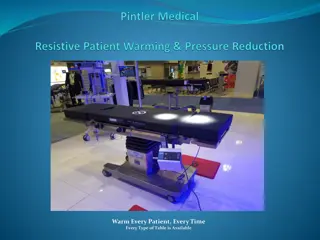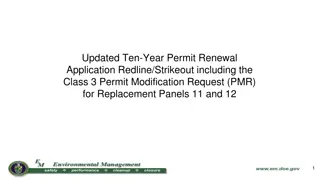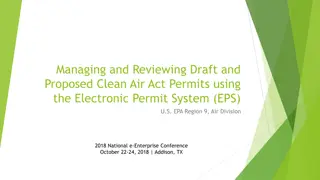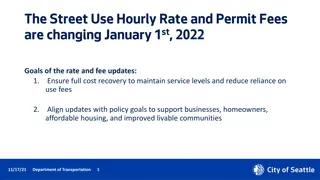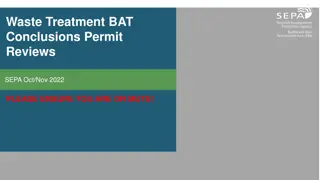Proposed General Permit for Well Pads: Key Concepts
This document outlines the development of a new general permit for well pad operations to reduce methane emissions in oil and gas operations. Details include the purpose, re-evaluation of RACT, and control technology considerations.
Download Presentation

Please find below an Image/Link to download the presentation.
The content on the website is provided AS IS for your information and personal use only. It may not be sold, licensed, or shared on other websites without obtaining consent from the author. Download presentation by click this link. If you encounter any issues during the download, it is possible that the publisher has removed the file from their server.
E N D
Presentation Transcript
Concepts for Proposed General Permit for Well Pads and Proposed GP-5 Modifications Citizens Advisory Council March 15, 2016 Tom Wolf, Governor John Quigley, Secretary 1
Headings : White Text 40 pt. Calibri Purpose of the Final RACT Rulemaking Background On January 19, 2016, Governor Tom Wolf announced a four- point methane emission reduction strategy for Oil and Gas operations. DEP will develop a new general permit for new unconventional well pad operations. DEP will revise its current general permit (GP-5) updating the permitting requirements. DEP will develop a regulation for existing sources for consideration by the Environmental Quality Board. DEP will establish best management practices, including leak detection and repair programs to reduce emissions along production, gathering, transmission and distribution lines. 2
Concepts for the General Permit for Well Pad Operations Headings : White Text 40 pt. Calibri Purpose of the Final RACT Rulemaking Oil and natural gas wells are currently exempted from permitting requirements provided the owner or operator complies with the Category No. 38 exemption criteria specified in DEP s list of Air Quality Permit Exemptions. (Document No. 275-2101-003). As part of the DEP s Methane Emission Reduction Strategy, DEP is developing a new general permit to replace the Category No. 38 exemption criteria for well pad operations. 3
What is Reasonably Available Control Technology? Concepts for the General Permit for Well Pad Operations Headings : White Text 40 pt. Calibri Most of the substantive requirements for the Category No. 38 exemption criteria will be proposed in the new general permit for well pads operations. The DEP is also exploring the possibility of proposing that diesel-fired engines used on drill rigs meet the EPA s Tier 4 standards. The leak detection and repair (LDAR) requirements proposed may be similar to the current GP-5, including quarterly LDAR inspections using an optical gas imaging system and monthly Audio Video Olfactory (AVO) inspections. 4
Concepts for the General Permit for Well Pad Operations Headings : White Text 40 pt. Calibri Re-evaluation of RACT The first attempt at a leak repair would be done within five (5) calendar days of leak detection. If purchase of parts is necessary, the leak must be repaired within 15 calendar days after the purchase of parts. VOC emissions from storage tanks must be controlled by at least 95%. The proposed general permit for well pads will also include fugitive dust control measures. 5
Concepts for the General Permit for Well Pad Operations Headings : White Text 40 pt. Calibri Re-evaluation of RACT The DEP intends to propose no-bleed and/or low-bleed requirements for pneumatic controllers and pumps. Emissions from pumps may also be controlled through routing pump discharge streams into a closed loop system or a vapor recovery unit. The proposed GP may also require the operation of pig launchers without venting hydrocarbons into the atmosphere. 6
Concepts for the General Permit for Well Pad Operations Headings : White Text 40 pt. Calibri Re-evaluation of RACT The proposed GP may require plunger lifts or flaring to reduce methane emissions from wellbore liquid unloading. The DEP is examining strategies to reduce emissions from produced water impoundment tanks. The DEP is considering add-on controls on enclosed storage tanks or a closed loop system for an efficient reuse of produced water. Annual compliance certifications may be required to be submitted to the DEP by a Responsible Official, as is the case under the current GP-5. 7
Concepts for GP-5 Modifications Headings : White Text 40 pt. Calibri Final RACT Rulemaking Impacts An owner or operator of natural gas compressor stations may request authorizations to use DEP s General Plan Approval and General Operating Permit for Natural Gas Compression and/or Processing Facilities (GP-5). Modifications to existing GP-5 are being developed for public review and comment. The applicability of GP-5 may be extended to natural gas transmission operations. 8
Concepts for GP-5 Modifications Headings : White Text 40 pt. Calibri Final RACT Rulemaking Impacts The DEP may require no-bleed and/or low-bleed pneumatic controllers. The first attempt at leak repair would be required within five (5) calendar days of leak detection. If the purchase of parts is necessary, the leak must be repaired within 15 calendar days after the purchase of parts. 9
Concepts for GP-5 Modifications Headings : White Text 40 pt. Calibri Final Rulemaking: Affected Facilities The DEP intends to require owners and operators to prevent venting of VOCs and methane during all compressor maintenance and operational activities. The proposed GP-5 modifications will require the control of air contaminant emissions from storage tanks by at least 95%. The general permit may require the operation of pig launchers without venting hydrocarbons into the atmosphere. 10
Concepts for GP-5 Modifications Headings : White Text 40 pt. Calibri Final Rulemaking: Affected Facilities The DEP intends to propose the use of electric pumps or routing pumps discharged to closed systems when electricity is not available. Emissions from pneumatic pumps driven by natural gas may also be controlled through routing pump discharge streams into a closed loop system or a vapor recovery unit, or the pumps may be replaced with zero bleed pumps. The use of dry seals or control of wet seal venting of methane from each compressor by 95% would also be included in the proposed GP-5 modifications. 11
Useful Links Headings : White Text 40 pt. Calibri Final Rulemaking: Affected Facilities Methane Reduction Strategy Page http://www.dep.pa.gov/Business/Air/Pages/Methane-Reduction- Strategy.aspx Methane Strategy Briefing Paper http://files.dep.state.pa.us/Air/AirQuality/AQPortalFiles/Methane/ DEP%20Methane%20Strategy%201-19-2016%20PDF.pdf Methane Strategy Briefing Paper Appendix http://files.dep.state.pa.us/Air/AirQuality/AQPortalFiles/Methane/ Appendix%20A%20-%20Comparison%20of%20PA- %20EPA%20NSPS%20Proposal-%20CSSD%20- %20CO%20Requirements%20for%20the%20Oil%20and%20Gas%20 Sector%20%2012-15-2015.pdf 12
Krishnan Ramamurthy Chief, Division of Permits 717-783-9476 kramamurth@pa.gov 13
